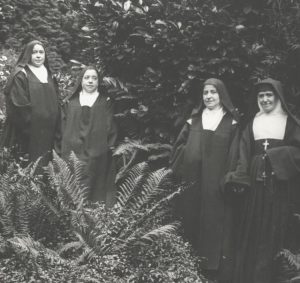Archive, Readings
Desert Fathers 39
You can find this episode in video format here – a dedicated page – and pick it up in audio wherever you listen to podcasts. On YouTube, the full range of episodes can be found here.
A government official heard about Abba Moses and went off to Scetis to see him. Some people announced to the elder what was happening. He got up and fled into the marshes. The official ran into him there and said: ‘Tell us, old man: where is the cell of Abba Moses?’ He said to them: ‘What do you want from him? He is a simpleton and a heretic.’ The official went to the church and said to the clergy: ‘Having heard a lot about Abba Moses, I came to see him. Then we encountered an elder who was on his way to Egypt and we said to him: “Where is the cell of Abba Moses?” And he told us: “What do you want from him? He is a simpleton and a heretic.”’ Hearing this the clergy were saddened. They said to the official: ‘What sort of fellow was it that spoke in this way about the holy man?’ [The visitors] answered: ‘He was a big, black man wearing ancient clothes’. The clergy said: ‘That was Abba Moses! He said these things about himself because he did not want to meet you.’ Then the official retired, greatly edified.
The Fathers were allergic to devout trophy-hunters. They would go to great lengths to avoid them in order to prevent the emergence of personality cult. We have already encountered Abba Moses. We know he was shrewd. Here we find him playing something of a practical joke on a highly-placed official keen to see him. Moses must have known that this man’s intention was superficial and motivated by vanity. Had the official been someone in trouble, he would not have run away. The Fathers never shunned those who came in need of help, counsel, or charity.
Moses does not deny being himself; he evaluates his public persona. We may ask: should he have referred to himself as a heretic? We know how concerned the Fathers were to keep right faith. Remember that the Greek word can also sustain the more general sense of ‘factious’ or ‘causing divisions’. Moses runs himself down to prevent the emergence of a holy-man myth. So important was this aspect of humility to the early monks that they sometimes staged such skits to make their point.
Abba Simon was another one who laboured to keep out of the public eye. Two sayings present him in a predicament like that of Abba Moses, having to confront the sudden appearance of a curious official, eager, as local politicians always are, to find people and places of distinction who might enhance their region’s fame. On one occasion, hearing that the distinguished guest was near, Simon climbed into a palm tree and started cleaning its leaves, cutting quite the figure of the village idiot. When the official shouted up to him: ‘Old man, where is the hermit?’, Simon called back, ‘No hermit here!’, which, in the circumstances, was true.
Another time, when Simon was told, ‘Get ready, for the governor has heard of you and is on his way to ask your blessing’, he promptly installed himself in front of his hermitage with a nice spread of bread and cheese. The governor arrived. Finding the elder tucking into a hearty meal in full view of all, he was disappointed. He had expected to find Simon fasting and at prayer. He and his entourage ‘turned around and went away.’ The strategy had worked. Simon would rather be disdained as decadent than idealised.
The attitude encountered in these saying may seem brash. In fact it shows us the face of humility interiorised. These monks are not going around advertising their lowliness. They are simply concerned that people should not think too highly of them; in fact, they would prefer it if people did not think about them at all.
We find a precise modern equivalent in the life of Léonie Martin, the only non-Carmelite sister of Thérèse of Lisieux and least outstanding among the siblings. Having been rather troubled as a child, Léonie took while to find her vocational path. She eventually joined the Visitation Sisters in Lisieux, where she thrived and eventually died in the odour of sanctity. Léonie sometimes served as portress, receiving visitors and calls. Lisieux was a small place. The cult of Thérèse was flourishing. Pilgrims who knew that the saint’s sister was a nun in a convent less strictly cloistered than Carmel sometimes came to catch a glimpse of her. One day when Léonie was in the porter’s lodge, a visiting priest turned up, asking to see the saint’s blood-sister.
With perfect composure, Léonie replied: ‘We will ask our Mother [Superior], but I don’t think it will be possible.’ The priest answered: ‘Oh, that would be a great disappointment!’ To which Léonie replied: ‘However, Father, I can assure you that you won’t be missing anything — it isn’t worth the trouble.’ This comment evidently shocked and scandalised the priest, who was astonished that the sister of such a well-known saint seemed to be taken so lightly; he made no reply, but left, disconcerted. He happened to meet the chaplain, whom he told of his amazement. The chaplain burst out laughing and exclaimed, ‘My poor Father, you have been tricked — you were talking to Léonie herself.
That was Léonie’s equivalent of climbing a palm tree or chomping camembert before the convent gate. These days, when evangelisation is tied up, often for good, with self-advertising in pursuit of numerous audiences, it is good to bear the example of these hardy souls in mind to make sure we, like them, ultimately point away from ourselves towards him who alone can satisfy searching hearts and minds.

The Martin Sisters. Léonie to the right.
